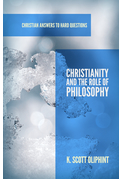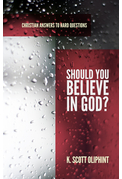Today we highlight three more titles in P&R’s series of popular-level booklets, Christian Answers to Hard Questions.
In Christianity and the Role of Philosophy K. Scott Oliphint sets out to establish the relationship of philosophy and theology. He begins with a helpful definitions, describing philosophy as a theoretical discipline that seeks to make sense of reality and of our place in it, an ambitious agenda that is of course all-embracing but generally focusing on questions of metaphysics (the nature of ultimate reality), epistemology (the ground of knowledge), and ethics (moral philosophy, judgments of value and of obligation). Oliphint notes that after 4,000 years in this pursuit philosophers have confessed that surprisingly little progress has been made, and no single philosophy has won the day. The problem, he vividly points out, is that secular philosophies have no sure point of reference. Seeking on its own to account for things beyond itself can never be a fruitful task. Questions of metaphysics, epistemology, and ethics must all begin with the God who has revealed himself. That is to say (turning now to the precise subject of Oliphint’s study) philosophy cannot govern theology, but only as theology is given its rightful primary place can we make certain progress in philosophical pursuit. This is the role of philosophy: it does not govern but is governed by theology. All pursuit of knowledge, in every discipline, is grounded in the self-revelation of the triune God.
However, as subservient to theology philosophy has a very useful role (and here Oliphint traces out Francis Turretin’s famous guidelines set for philosophy in theological pursuit) in confirming and distinguishing revealed truth. Finally, he traces Turretin’s warnings against the unwarranted intrusion of philosophy in theological pursuit, affirming again that philosophy does not rule but is ruled by divine revelation.
The average layman may not be accustomed to thinking in terms of philosophical categories of metaphysics, epistemology, first principles, and such. Even so, Oliphint provides here a remarkably accessible introduction to Reformed presuppositionalism, briefly and yet clealry explained at the lay level. A helpful glossary of terms is provided at the end also.
In his Should You Believe in God? Scott Oliphint provides another introduction to Reformed presuppositional thinking, this time in an evangelistic context. His booklet consists of a fictional conversation that he has with an inquirer. The concept of “truth” is briefly acknowledged by both sides at the outset (else the discussion would require a different direction), and from there Oliphint leads his inquirer carefully, step by step, through successive considerations and conclusions that necessarily culminate in the God who has revealed himself in Scripture and who gives salvation in Jesus Christ. Along the way he discusses how we can know and discern between competing claims, whether the human mind is neutral or reliable in weighing such questions, and what is needed for us to decide matters of ultimate truth.
Again, although the conversation treats questions and lines of thought that do not often confront the layman, the approach is “popular” level and accessible. The thinking is careful and informed, and the statements are precise, but the conversation is easy to follow, and the argument is cogent. This little booklet of fewer than twenty-five small-sized pages is an excellent primer for the Christian and a wonderful tool for university evangelism.
In his How Can I Know for Sure David Garner explains that human reasoning at its very best is finite and therefore unable to provide answers to ultimate questions. For all the light that various philosophies have shed on this area of learning or that, they have in the end demonstrated the limitations of the human mind and its inability to obtain answers to ultimate questions. Human religions likewise, with their “matter of taste” approach, can rise no higher than human analysis. All human attempts must inevitably fail. For ultimate answers we are dependent on an ultimate source; that is to say, we are dependent on divine revelation. Only God himself can answer ultimate questions. Garner further explains that those nagging ultimate questions, then, are “windows into our God-consciousness” (p.11), and that God in mercy has not left us to our own futile pursuits. He has spoken. Given our fallenness in sin, however, we are blind to the divine character of Scripture. And so yet again God comes to us in grace and by his Spirit opens the eyes of our minds to recognize Scripture as his very Word, to which we, in turn, are accountable.
In under 30 small pages each these booklets cover a remarkable amount of ground effectively, and throughout each are study questions and discussion points for reflection and for group study. These are very useful tools for the church to put to use.
Here again are the titles in the series.
Greg Beale, The Morality of God in the Old Testament
Brandon Crowe, Was Jesus Born of a Virgin?
William Edgar, How Did Evil Come Into the World?
David Garner, How Can I Know for Sure?
Guillermo Gonzalez and Jay Richards, Creation, Evolution, and Intelligent Design
Scott Oliphint, Christianity and the Role of Philosophy
Scott Oliphint, Should You Believe in God?
Vern Poythress, Christian Interpretations of Genesis 1
Vern Poythress, Did Adam Exist?
Fred G. Zaspel
Buy the books

Christianity and the Role of Philosophy

How Can I Know for Sure?

Should You Believe in God?